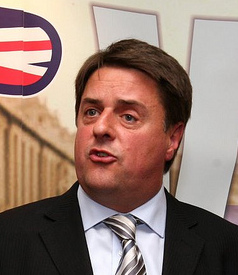Nick Griffin
| Nick Griffin | |
|---|---|

Griffin at a BNP conference, 2009
|
|
| President of the British National Party | |
|
In office 21 July 2014 – 1 October 2014 |
|
| Chairman of the British National Party | |
|
In office 27 September 1999 – 21 July 2014 |
|
| Preceded by | John Tyndall |
| Succeeded by | Adam Walker |
| Member of the European Parliament for North West England |
|
|
In office 4 June 2009 – 2 July 2014 |
|
| Preceded by | Den Dover |
| Succeeded by | Louise Bours |
| Personal details | |
| Born |
Nicholas John Griffin 1 March 1959 Barnet, England |
| Nationality | British |
| Political party |
British National Party (1995–2014) National Front (1974–1989) |
| Spouse(s) | Jackie Griffin (1985–present) |
| Relations | Edgar Griffin (father) Jean Griffin (mother) |
| Children | 4 |
| Residence | Llanerfyl, Powys, Wales |
| Alma mater | Downing College, Cambridge |
| Profession | Politician |
Nicholas John Griffin (born 1 March 1959) is a British politician who represented North West England as a Member of the European Parliament (MEP) from 2009 to 2014. He served as chairman and then president of the far-right British National Party (BNP) from 1999 to 2014, when he was expelled from the party.
Born in Barnet, Griffin was educated at Woodbridge School in Suffolk. He joined the National Front at the age of 14 and, following his graduation from the University of Cambridge, became a political worker for the party. In 1980 he became a member of its governing body, and later wrote articles for several right-wing magazines. He was the National Front's candidate for the seat of Croydon North West in 1981 and 1983, but left the party in 1989. In 1995 he joined the BNP and in 1999 became its leader. He stood as the party's candidate in several elections and became a member of the European Parliament for North West England in the 2009 European elections.
In 1998 Griffin was convicted of distributing material likely to incite racial hatred, for which he received a suspended prison sentence. In 2006 he was acquitted of separate charges of inciting racial hatred. Griffin has been criticised for many of his comments on political, social, ethical and religious matters, but after becoming leader of the BNP he sought to distance himself from some of his previously held positions, which include Holocaust denial. In recent years, events where Griffin has been invited to participate in public debates or political discussions have proven controversial and often resulted in protests and cancellations.
...
Wikipedia
